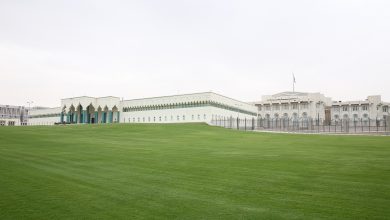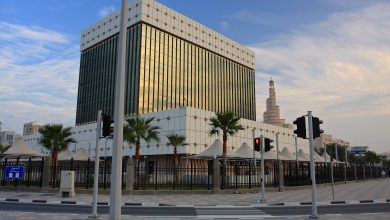
Qatar succeeded at managing Gulf crisis, say experts
خبراء ومحللون استراتيجيون: قطر نجحت في إدارة الأزمة الخليجية وأصبحت أكثر قوة
Strategic experts and analysts confirmed that Qatar has succeeded in managing the current Gulf crisis and was able to overcome it, and undermined the efforts of the siege countries to weaken its sovereignty, economy and social cohesion.
They pointed out that Qatar became stronger in light of the current Gulf crisis, and provided a successful model in how to manage crises and turn the challenges into opportunities, and adopt flexible strategies to address the consequences of the siege, especially at the political and economic levels, during the “Third Annual International Interdisciplinary Conference: Gulf Crisis, Repercussions and Future” by the Gulf Studies Center (GSC) at Qatar University (QU).
During a session on “Crisis Management in the Era of Global Network – The Case Of Qatari Blockade”, Dr Adriana Lukaszewicz from Kozminski University, said that after 18 months of siege Qatar appears to be more resilient to the repercussions of the crisis. “There has been a change in the nature of the threats associated with the crisis, specially after Qatar has succeeded in turning challenges into opportunities by improving all its economic sectors, and building new regional and international alliances.”
She explained that success in crisis management is directly related to the success of the management in general, and it reflects the overall success in the state management.
“Qatar’s response to the crisis and its rapid success in overcoming it, finding alternative commercial goods in record time, creating new alliances, and seeking self-sufficiency in agricultural and industrial goods is interesting,” Dr Lukaszewicz added.
Dr Wojciech Grabowsk, a specialist in political science, said that Qatar has been able to face the crisis through its dependence on collective management, and adopted a strategy through which it faced all the repercussions, especially on the political and economic levels, leaving only the social repercussions done by the siege countries in the separation of families, and the disruption of social ties.
He added, “Qatar has taken effective measures to counter the negative propaganda campaigns organised by the siege countries against the image of the state, especially in Western countries, as Qatar succeeded in this, whether in the media or through the actual actions by strengthening alliances with countries of the world, including the United States, and major European and regional countries.”
He also pointed out that Qatar also won in its campaign against the human rights violations that affected the Qatari citizens, because of the measures of the countries of the blockade, and the position of the Human Rights Council a strong victory in the face of the besieged states.
Dr Wojciech Grabowski praised the public cohesion along with the leadership during the crisis.
He said that there was a popular enlightenment campaign that showed the cohesion of society between the leadership and people and showed the harmony between Qataris and residents and made it more powerful to face new threats.
Dr Kristian Coates, the keynote speaker, said that one of the most important repercussions of the crisis is the sharp Gulf division and the introduction of new players in the Gulf scene. “The confusion of the US administration in dealing with the crisis and its inability to resolve it doubled those repercussions.”
Dr Majid al-Ansari, professor of political psychology at Qatar University (QU), presented a paper titled “The inevitableness of GCC conflicts: An analysis of intra-gulf relations and regional hegemony attempts”, where he analysed the relations between the Gulf states and attempts at regional hegemony.
Dr Hassan Rashid al-Derham had inaugurated the Third Annual International Interdisciplinary Conference and highlighted the importance of the conference to consolidate academic understanding of political, economic and social aspects of the current Gulf crisis, in order to develop mechanisms that help to understand their origins, implications and prospects as a crisis that exceeded all expectations.
He added that the conference comes in conjunction with many regional and international developments including the Summit of the GCC Supreme Council.
Dr Mahjoob Zweiri, director, Gulf Studies Centre, said the conference comes as part of the centre’s focus on interactive issues in the Gulf regions and is part of many events that documents the reactions of the Gulf crisis.
He added that the centre’s vision is to develop and promote QU’s goal to develop academic researches in Qatar and the regions, through producing academia that reflects the history of the GCC crisis which is a transitive crisis in its various dimensions.
The conference brings together scholars, policy makers and students from a wide-range of disciplines to engage in a two-day conference. The conference has also invited Munich Security Conference (MSC) chairman Wolfgang Ischinger who will be giving a speech on the European Role in Regional Security of the Gulf in the afternoon of the first day of the conference. (QNA)
انطلقت في جامعة قطر أعمال المؤتمر الدولي الثالث لمركز دراسات الخليج، الذي يتمحور حول الأزمة الخليجية الأصل والتداعيات والآفاق بمشاركة نخبة من الخبراء والمحللين السياسيين الذين تناولوا ابستمولوجيا الأزمة الخليجية إلى جانب الأبعاد الأمنية ودور الإعلام وتكنولوجيا المعلومات في الأزمة الخليجية وكيفية إعادة تشكيل التحالف في الخليج بعد الأزمة..
وقد أكد خبراء ومحللون إستراتيجيون أن دولة قطر نجحت في إدارة الأزمة الخليجية الراهنة وتمكنت من التغلب عليها وقوضت مساعي دول الحصار للنيل من سيادتها واقتصادها وتماسكها الاجتماعي. ولفتوا في مداخلاتهم خلال اليوم الأول للمؤتمر إلى أن دولة قطر أصبحت أكثر قوة في ظل الأزمة الخليجية الراهنة، وقدمت نموذجا ناجحا في كيفية إدارة الأزمات وتحويل التحديات إلى فرص، واعتماد استراتيجيات مرنة لمواجهة التداعيات الناجمة عن الحصار لاسيما على الصعيدين السياسي والاقتصادي.
وقالت الدكتورة أدريانا لوكاسزويكز أستاذة الاقتصاد والعلاقات الدولية في جامعة كوزمونيسكي في وارسو “بولندا” في مداخلة بعنوان “إدارة الأزمات في عصر الشبكات العالمية.. قطر نموذجا” إن قطر بعد 18 شهرا من الحصار تبدو أكثر قوة وصمودا في وجه التداعيات التي خلفتها الأزمة.. مضيفة: “هناك تغير في طبيعة التهديدات المرتبطة بالأزمة، بعد أن نجحت قطر في تحويل التحديات إلى فرص من خلال تفعيل كافة قطاعاتها الاقتصادية، وبناء تحالفات جديدة إقليمية ودولية”.
وأوضحت الدكتورة لوكاسزويكز أن النجاح في إدارة الأزمة يرتبط بشكل مباشر مع النجاح في الإدارة بشكل عام، وإن كانت الأولى تتم في أطر ضيقة إلا أنها تعكس النجاح العام في إدارة الدولة. وأضافت “إن ردة فعل قطر تجاه الأزمة ونجاحها السريع في تجاوزها وإيجاد البدائل للسلع التجارية في وقت قياسي، وخلق تحالفات جديدة، والسعي نحو الاكتفاء الذاتي من السلع الزراعية والصناعية هي أمر مثير للاهتمام”.
الإدارة الجماعية
بدوره قال الدكتور فويتش جرابوسكي المتخصص في العلوم السياسية: “إن قطر تمكنت من مواجهة الأزمة من خلال اعتمادها على الإدارة الجماعية، وتبنت إستراتيجية من خلالها واجهت كل التداعيات لاسيما على الصعيدين السياسي والاقتصادي، ولم يتبق سوى التداعيات الاجتماعية المتمثلة في إجراءات دول الحصار في تفريق الأسر وتمزيق الروابط الاجتماعية”. وأضاف: إن قطر اتخذت إجراءات فعالة لمواجهة حملات الدعاية السلبية التي نظمتها دول الحصار ضد صورة الدولة خصوصا في الدول الغربية، ونجحت في ذلك سواء على الصعيد الإعلامي أو من خلال الإجراءات الفعلية عبر تعزيز تحالفاتها مع دول العالم ومنها الولايات المتحدة، ودول أوروبية وإقليمية كبرى…
ولفت الدكتور فويتش جرابوسكي إلى أن دولة قطر أصبحت أقوى بشكل أكبر مما هو متوقع، وتخلصت من الكثير من التبعات التي كانت تمليها عليها علاقاتها مع بعض دول مجلس التعاون، كما لفت إلى أن قطر ربحت أيضا في حملتها ضد الانتهاكات الحقوقية التي طالت المواطنين القطريين، بسبب إجراءات دول الحصار، وشكل موقف مجلس حقوق الإنسان انتصارا قويا لها في مواجهة الدول المحاصرة”.
التلاحم مع القيادة
وأشار الدكتور فويتش جرابوسكي في سياق مداخلته إلى التلاحم الشعبي مع القيادة الذي تجلى خلال الأزمة.. وقال “كانت هناك حملة تنوير شعبية أظهرت مدى تماسك المجتمع، وعكست التلاحم بين القيادة والشعب، والانسجام بين القطريين والمقيمين، وجعلت منه أكثر قوة في مواجهة الأخطار الجديدة”. وتطرق إلى تداعيات الأزمة الخليجية على صعيد بنية مجلس التعاون الخليجي.. منبها إلى أن الأزمة شقت الصف الخليجي وغيرت مجرى التحالفات لكل الدول الأعضاء في المجلس.
الانقسام الخليجي الحاد
وفي السياق ذاته تحدث الدكتور كريستن كوتس زميل في معهد بيكر للسياسة العامة في جامعة رايس ومختص في شؤون الشرق الأوسط عن تصورات التهديد وتغير الديناميكيات الإقليمية بفعل الأزمة الخليجية الراهنة، لافتا في هذا السياق إلى أن تداعيات الأزمة ستظل ماثلة وإن وجدت طريقها إلى الحل. كما لفت الدكتور كوتس، وهو محاضر رئيسي في المؤتمر، إلى أن من أهم تداعيات الأزمة هو الانقسام الخليجي الحاد، ودخول لاعبين جدد على الساحة الخليجية، مبينا أن تخبط الإدارة الأمريكية في التعامل مع الأزمة وعجزها عن الحل ضاعف من تلك التداعيات.
وقدم الدكتور ماجد الأنصاري أستاذ علم الاجتماع السياسي بجامعة قطر مداخلة بعنوان “حتمية النزاعات في دول مجلس التعاون الخليجي..” تناول فيها بالتحليل العلاقات بين دول الخليج ومحاولات الهيمنة الإقليمية.
خلل في منطقة الخليج
وكان الدكتور حسن راشد الدرهم قد افتتح أعمال المؤتمر الدولي الثالث لمركز دراسات الخليج، بكلمة أكد فيها أهمية هذا المؤتمر في ترسيخ الفهم الأكاديمي لجميع الجوانب السياسية والاقتصادية والاجتماعية للأزمة الخليجية الراهنة، وذلك من أجل بلورة آليات تساعد على فهم أصلها وتداعياتها وآفاقها باعتبارها أزمة فاقت كل التوقعات. كما أشار الدكتور الدرهم إلى أن المؤتمر يأتي بالتزامن مع كثير من التطورات الإقليمية والدولية، ومنها انعقاد قمة مجلس التعاون لدول الخليج العربية.. معربا عن الأسف بأن هذا المجلس لم يستطع بصفته الحالية وأدواته المتاحة معالجة هذه الأزمة.
وقال الدرهم إن المنطقة العربية بشكل عام تعاني مختلف أنواع الأزمات وبشكل متواصل ومستمر منذ عقود عديدة ربما أكثر من أي منطقة أخرى في العالم كله. وتواجه اليوم تزايداً ملحوظاً في تواتر وحِدّة الأزمات المتلاحقة، واتساع نطاقها، مما من شأنه أن يعوق مسيرة التنمية الشاملة وجهود السلام.. وقد جاءت الأزمة الخليجية لترسخ لهذا الخلل في المنطقة.
خبراء عالميون يناقشون الأزمة
بدوره قال الدكتور محجوب زويري مدير مركز دراسات الخليج بجامعة قطر “إن هذا المؤتمر يأتي في سياق تركيز مركز دراسات الخليج بجامعة قطر على القضايا المتفاعلة في منطقة الخليج كما أنه يأتي ضمن العديد من الفعاليات التي توثق تفاعلات الأزمة الخليجية”.
وأضاف “تصب رؤية مركز دراسات الخليج في تطوير وتعزيز رؤية جامعة قطر لتطوير الأبحاث الأكاديمية في قطر والمنطقة ككل، وذلك من خلال إنتاج أكاديمي يعكس تاريخ أزمة دول مجلس التعاون الخليجي، والتي تعد أزمة متعدية في أبعادها المختلفة”.
ويشارك في المؤتمر نخبة من الخبراء والباحثين والمحللين الاستراتيجيين والمتخصصين وصناع القرار والسياسات وأصحاب المصلحة المحليين والدوليين، كما يستضيف في إحدى جلساته اللاحقة سعادة السفير السيد فولفجانج إيشينغر رئيس مؤتمر ميونيخ للأمن والذي سيتحدث عن “الدور الأوروبي في أمن الخليج”، بالإضافة إلى مشاركة مجموعة من طلبة الدراسات العليا من مختلف التخصصات للمساهمة في تعزيز المناقشة حول العديد من الموضوعات المتداخلة حول الأزمة الخليجية. ويقدم المؤتمر دراسة شاملة للحصار المستمر على دولة قطر ويغطي أربعة مواضيع أساسية تتمثل في ابستمولوجيا الأزمة الخليجية، وأمن المعلومات والأمن السيبراني، ودور وسائل الإعلام وتكنولوجيا المعلومات في الأزمة، والتحول في التحالفات السياسية.



